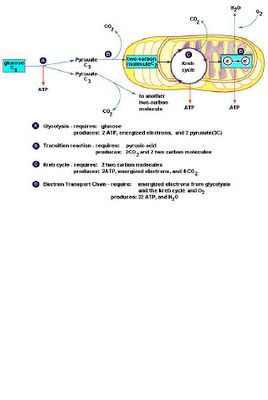
Cellular Respiration 
This is to help review cellular respiration. Please print this off and bring to class on friday to complete. I appologize for not being at school this week, but I have come down with pneumonia and a case of the flu.
Your UNIT TEST will be on WEDNESDAY MARCH 9th, as I want to go over a few things with the class first.
Glycolysis & Fermentation
1. What organisms trap sunlight & store it in carbohydrates?
2. What 2 organisms break down carbohydrates to release energy from cells?
3. What is the main energy currency of a cell?
4. Define cellular respiration.
5. What process begins cellular respiration & does it produce much ATP?
6. If there is no oxygen in cells, the products of glycolysis enter ________________________
pathways that yield no additional ______________________.
7. Fermentation is __________________________ because no oxygen is used.
8. If oxygen is present in cells, the glycolysis products enter the ______________________
respiration pathway.
9. Does aerobic respiration produce much ATP?
10. What simple sugar starts glycolysis?
11. In glycolysis, glucose is broken into 2 molecules of _______________________ acid
in the ______________________ of the cell.
12. In which part of the cell does fermentation occur? Is oxygen involved?
13. Name the 2 types of fermentation.
14. __________________________ acid fermentation helps make cheese & yogurt and also
occurs in _______________________ cells during heavy exercise.
15. What effect does lactic acid have on muscle cells?
16. Yeasts carry on what type of fermentation?
17. What alcohol is made in alcoholic fermentation?
21. Aerobic respiration requires what gas?
22. How much more ATP does aerobic respiration produce than glycolysis alone?
23. Name the 2 major stages of aerobic respiration.
24. What is completed in the Krebs cycle?
25. The energy carrier NAD+ is reduced to what substance?
26. Which part of aerobic respiration makes most of the ATP (cell’s energy)?
27. Where does aerobic respiration take place in prokaryotes?
28. Where do these reactions take place in eukaryotes?
SBI3U - Mr. SMITH BIOLOGY
Welcome to your interactive science experience. You will be able to view lesson materials, copy worksheets, and get review work from this interactive website. This website will have links posted for you to follow to gain a more in-depth understanding of the topics that we cover in class. Now, scroll thorugh, click on the links, send me emails and enjoy! (pg ref. from BIOLOGY 11 McGraw-Hill Ryerson textbook)

2 Comments:
Hi Mr. Smith!
I know that this is an old page, but i was hoping that you might still check it for comments. I was wondering when you were going to update the site for new information that I missed on Friday such as the notes and diagrams.
Hope you're having a great march break!
Hi Mr. Smith!
I know that this is an old page, but i was hoping that you might still check it for comments. I was wondering when you were going to update the site for new information that I missed on Friday such as the notes and diagrams.
Hope you're having a great march break!
Post a Comment
<< Home